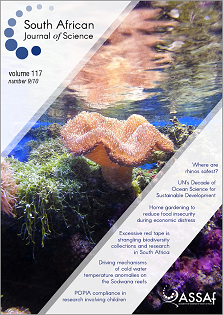Chemical pollution as a driver of biodiversity loss and potential deterioration of ecosystem services in Eastern Africa: A critical review
DOI:
https://doi.org/10.17159/sajs.2021/9541Keywords:
chemical pollution, biodiversity loss, ecosystem services, African wildlife, ecosystem healthAbstract
Chemical pollution, i.e. the release of anthropogenic chemical substances into the environment, is a driver of biodiversity loss. Although this issue has been widely investigated in high-income countries of temperate regions, there is a lack of data for tropical areas of middle- or low-income countries, such as those in Eastern Africa. Some of the world’s richest biomes that are affected by multiple pressures, including chemical pollution, are hosted in this macro-region. However, few studies have addressed the impact of the release of anthropogenic chemical pollutants on the biodiversity, and the related potential implications for the deterioration of ecosystem goods and services in this area. A contribution in systemising the scientific literature related to this topic is, therefore, urgently needed. We reviewed studies published from 2001 to 2021, focusing on the chemical pollution impact on Eastern African wildlife. Despite an extensive literature search, we found only 43 papers according to our survey methods. We focused on wildlife inhabiting terrestrial ecosystems and inland waters. According to our search, Kenya and Uganda are the most represented countries accounting for about half of the total number of reviewed articles. Moreover, 67.4% of the studies focus on inland waters. The spread of anthropogenic chemicals into tropical areas, e.g. Eastern Africa, and their effects on living organisms deserve greater attention in research and politics. We report a weak increasing trend in publishing studies addressing this topic that might bode well. The combined effort of science and governments is crucial in improving the management of chemical pollutants in the environment for achieving the goals of biodiversity conservation.
Significance:
- Chemical pollution represents an underestimated risk for the health of tropical ecosystems in middle- and low-income countries, such as those of Eastern Africa.
- There is a lack of data on chemical pollution effects on wildlife of Eastern African biomes.
- The anthropogenic release of chemical substances affects the health of biodiversity and humans, negatively influences ecosystem services in Eastern Africa, and makes conservation and protection measures less effective.
- There is an urgent need for improving research on chemical pollution effects and promoting a sustainable use of natural resources in Eastern Africa along with better management of farming and mining activities.
Published
Issue
Section
License

This work is licensed under a Creative Commons Attribution 4.0 International License.

All articles are published under a Creative Commons Attribution 4.0 International Licence
Copyright is retained by the authors. Readers are welcome to reproduce, share and adapt the content without permission provided the source is attributed.
Disclaimer: The publisher and editors accept no responsibility for statements made by the authors
How to Cite
- Abstract 1381
- PDF 1068
- EPUB 177
- XML 182












.png)